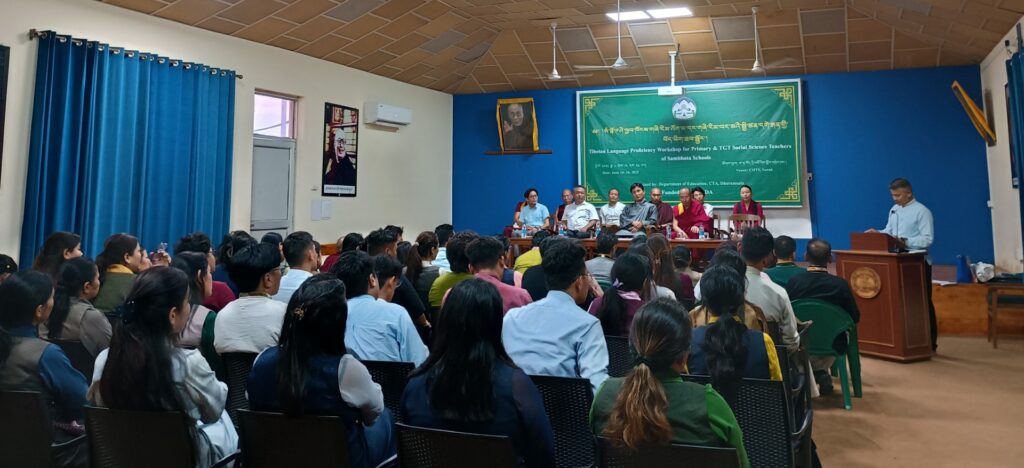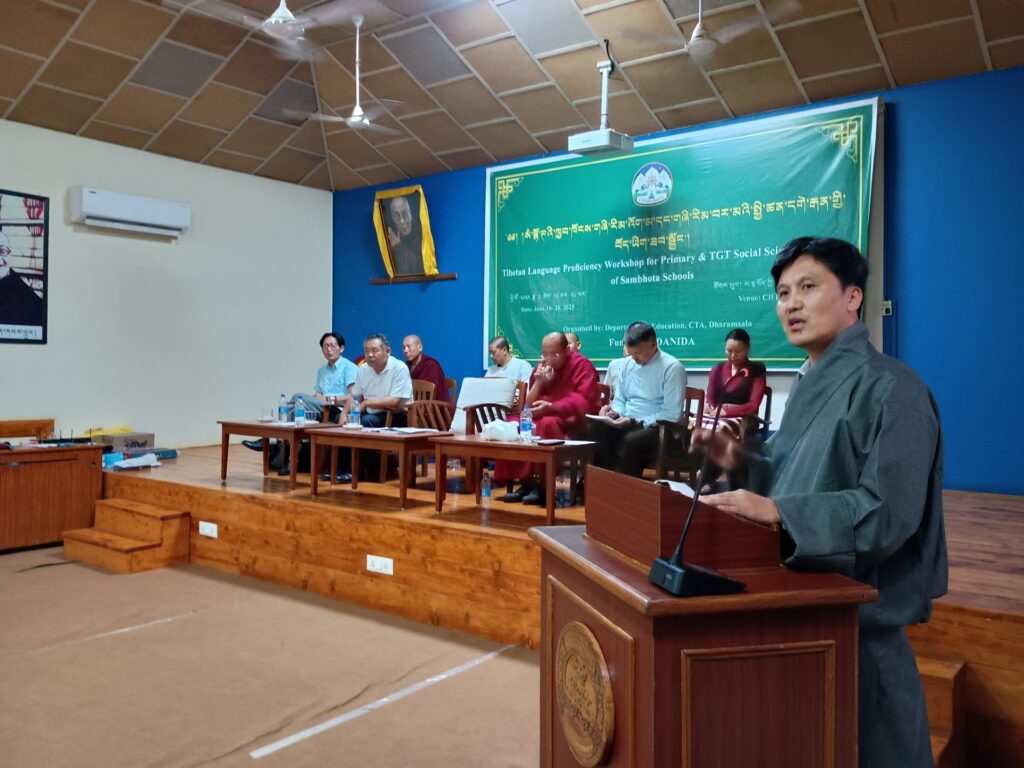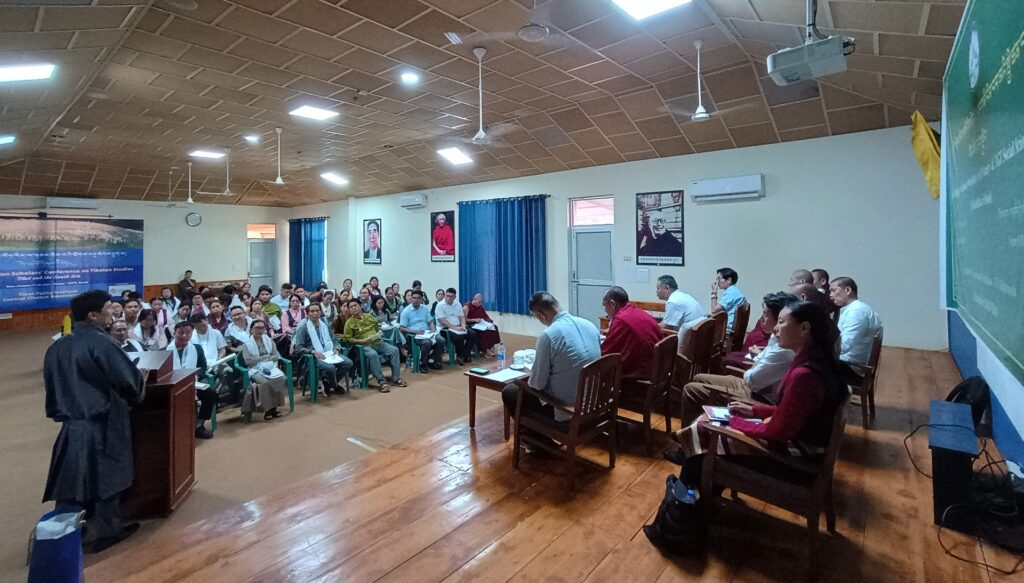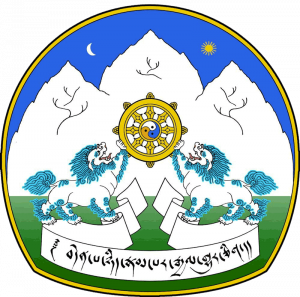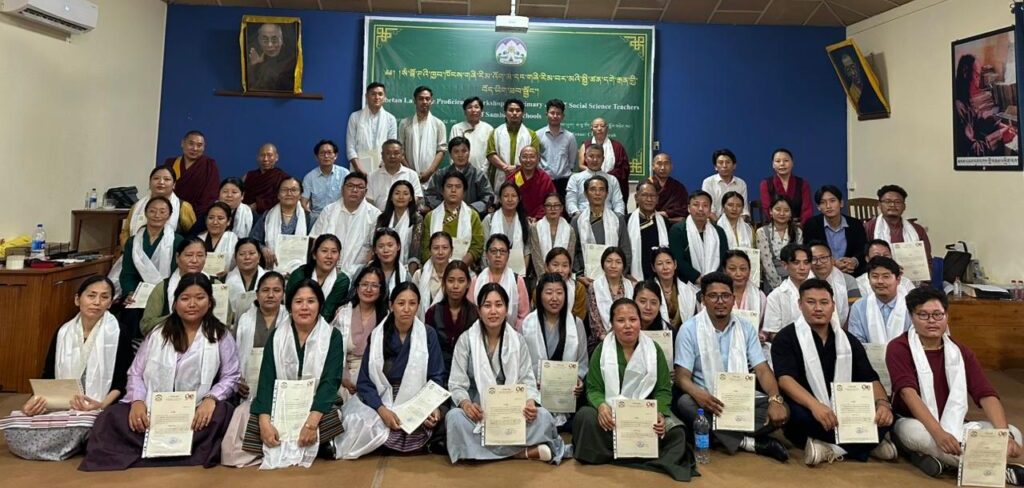
Dharamshala: The Department of Education concluded two workshops on 26 June 2025, Buddhist Dialectics (Riglam) for Sambhota’s secondary Tibetan teachers and Tibetan Language Proficiency Workshop for primary and Trained Graduate Teacher (TGT) Social Science teachers of Sambhota Schools.
The closing ceremony of the workshops was held at the College for Higher Tibetan Studies (CHTS) in Sarah from 16 to 26 June 2025 for ten days. The closing ceremony was presided over by the Tibetan Education Officer, Ngodup Tenpa, who presented a brief report on the objectives of the two workshops and the daily implementation of the program during the workshop.
Following that, Sarah College Vice-Principal Geshe Jigme Lodoe expressed his appreciation to the Department of Education for providing teachers with valuable opportunities to enhance their skills in Buddhist Dialectics and the Tibetan language. He also commended the large number of teachers who actively participated in the training. Geshe Jigme Lodoe reminded educators that, regardless of the level of social recognition the teaching profession receives, teachers must remain motivated and never lose hope. “Language is the lifeline of a nation,” he said, stressing that the preservation, promotion, and continuation of Tibetan religion and culture are deeply rooted in the strength of the Tibetan language. While there was once a favourable environment for the flourishing of Tibetan language, he noted that the situation has become increasingly fragile in recent times due to restrictive policies imposed by the Chinese government.
On the other hand, some Tibetan children in exile, born to Tibetan parents in foreign countries, end up being able to say only a few words in Tibetan. Vice Principal further prioritised the importance of the Tibetan language and paying attention to it. Similarly, the knowledge of Buddhist dialectics – logical reasoning in our tradition- is also very important. He quoted Je Tsongkhapa’s inspirational quotes related to the importance and benefits of Buddhist Dialectics.
Addressing the closing ceremony as chief guest, Education Secretary Jigme Namgyal underscored the significance of the Tibetan Primary Education Policy as the Basic Education Policy (BEP), which was introduced in 2004 and is set for full implementation by 2005. He noted that the policy has already yielded substantial benefits, particularly at the pre-primary and lower primary levels, where positive academic improvements have been recorded over the past two decades.
The Secretary commended the dedicated efforts of teachers across Sambhota schools for fostering a supportive and enriching learning environment. He emphasised that His Holiness the 14th Dalai Lama has continually advocated the inclusion of Buddhist Dialectics—especially its practice of logical reasoning and debate as an essential component of the Tibetan education system.
“His Holiness’s vision has guided us in integrating Buddhist Dialectics into the academic curriculum,” said Secretary Namgyal. “By doing so, students are not only rooted in Tibetan values but also better equipped to understand and engage with modern subjects such as science and mathematics.”
In continuation of efforts to enhance the quality of Tibetan-medium education, he highlighted the need to strengthen Tibetan language instruction across lower-level and intermediate social science classes. Citing that many teachers educated in English face challenges, such as limited Tibetan vocabulary and difficulty delivering lessons effectively. To address this, the DoE emphasised the need for targeted Tibetan language training for these teachers, reaffirming its commitment to improving the quality of education at foundational stages.
He shared a brief history of the Tibetan Basic Education Policy, noting that its initial development followed guidelines aligned with the Indian education system and the National Education Policy (NEP) of India. The Secretary highlighted the importance of integrating the Tibetan language across other subjects to ensure stronger academic outcomes in higher classes. He also commended the dedication of kindergarten and primary school teachers, describing them as the key pillars in supporting and nurturing the Tibetan language from an early stage.
Secretary Jigme Namgyal emphasised the importance of applying the knowledge that gained from the workshop to classroom teaching and future educational initiatives. He highlighted that teachers and school staff bear a profound responsibility in shaping the younger generation of Tibetans, who represent the future of the Tibetan people. With His Holiness the 14th Dalai Lama advancing in age, he stressed that it is the duty of the elder generations have to pass down this responsibility and ensure the preservation of Tibetan identity and values through education.
In his concluding remarks, he emphasised that teachers play a crucial role in nurturing a strong sense of cultural identity and patriotism in students from a young age. By instilling these values from early age, students are more likely to grow into responsible individuals who contribute meaningfully to society. With this empowering message and a renewed sense of purpose among participants, the ten-day workshop concluded successfully.
